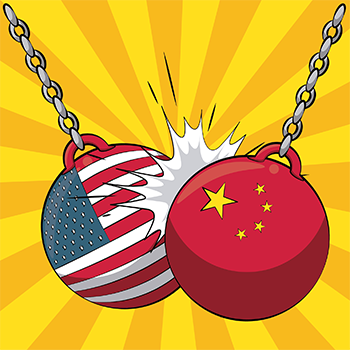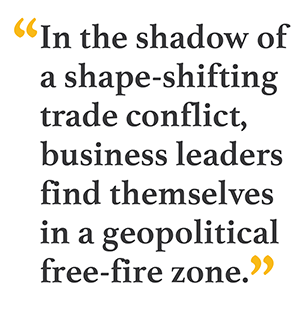 Toyota Motor Corp. has long tracked President Donald Trump's trade threats toward Japan, not to mention tweets slamming the automaker for building a new plant in Mexico. Yet when the U.S. actually imposed tariffs on aluminum and steel imports last year, Toyota's crisis management kicked into an entirely different realm.
Toyota Motor Corp. has long tracked President Donald Trump's trade threats toward Japan, not to mention tweets slamming the automaker for building a new plant in Mexico. Yet when the U.S. actually imposed tariffs on aluminum and steel imports last year, Toyota's crisis management kicked into an entirely different realm.
The company now has a “virtual war room” of about 150 employees mapping out the impact of various U.S. trade policy scenarios, according to a person familiar with its strategic planning. About 50 of them, mostly supply chain and logistics experts, are based in North America. The great unknown: Will Washington's rapid policy shifts on trade end in 2020, or carry on for another four years if Trump is re-elected?
In the shadow of a shape-shifting trade conflict between Washington and Beijing, business leaders find themselves in a geopolitical free-fire zone. The rules that have governed economic relations between both countries since China's growth miracle started in the 1980s are being torn up, forcing corporate executives to hedge against a great unraveling of supply chains, manufacturing networks, and pricing strategies.
“We are concerned that the U.S.-China trade war is going to affect everybody,” Akbar Al Baker, CEO of Qatar Airways, said at the International Air Transport Association's annual meeting in Seoul, where airlines see lower profits, freight traffic, and trade in 2019.
Or as Citigroup Inc. CEO Mike Corbat put it at a conference in New York on May 29: “If there's a trade war, no one necessarily escapes that.”
Great Unknown
Some executives remain confident that cooler heads will prevail among U.S. and Chinese trade negotiators. “There's too much self-interest in keeping this thing on the rails,” James Gorman, Morgan Stanley's CEO, told Bloomberg Television on May 30 in Beijing.
Yet the price of being wrong is huge, leaving executives little choice but to stress-test supply networks, capital spending, and product pricing plans. Their challenge is compounded by the near impossibility of figuring out what the future will look like during a time of massive political disruption.
“This contest will be a drawn-out process that will likely last our careers,” said Stephen Jen, a former economist at the International Monetary Fund (IMF) and Morgan Stanley who now runs Eurizon SLJ Capital, a hedge fund and advisory firm. “We as investors and analysts need to pace ourselves and try to not just follow the latest news. We need to understand the economics and the cultural differences.”
 Global stocks took a $4 trillion hit in May as global trade tensions ratcheted up. Morgan Stanley chief economist Chetan Ahya, meanwhile, sees a U.S. recession in less than a year should the Trump administration impose tariffs as high as 25 percent on an additional $300 billion of Chinese exports (on top of those $250 billion in goods already impacted) and Beijing retaliates in kind. The trade conflict will form the backdrop to the Group of 20 gathering of finance ministers and central bankers in Japan over the weekend.
Global stocks took a $4 trillion hit in May as global trade tensions ratcheted up. Morgan Stanley chief economist Chetan Ahya, meanwhile, sees a U.S. recession in less than a year should the Trump administration impose tariffs as high as 25 percent on an additional $300 billion of Chinese exports (on top of those $250 billion in goods already impacted) and Beijing retaliates in kind. The trade conflict will form the backdrop to the Group of 20 gathering of finance ministers and central bankers in Japan over the weekend.
While Trump's trade hawks haven't yet triggered a massive U.S. production shift back to the states, some companies are reassessing their Chinese factory networks. This month San Mateo-based action camera maker GoPro will start moving much of its U.S.-bound production from China to Guadalajara, Mexico.
About 70 percent of American companies doing business in China that participated in a survey last October by the American Chamber of Commerce in South China were considering moving all or part of their production out of the country.
Whether to bolt or double down on China depends on specific strategic factors, as well as a CEO's working assumption about how deep and long the U.S.-China conflict will run. For companies with long time horizons and huge fixed costs, China still might be worth the risk. Exxon Mobil Corp. is going forward with a planned multibillion-dollar chemical plant expected to begin operations in 2023, betting the project won't be ensnared in the current U.S.-China trade spat.
Exxon views the plant in the southeast province of Guangdong as a “lifelong investment” that'll have a “50- or 100-year timeline,” CEO Darren Woods said after the company's recent annual meeting. “While we're sensitive to what we're seeing in the current environment and the implications, and understanding how these implications will play themselves out, we're also trying to put that in the context of this longer-term time horizon.”
$7 Billion Hit
Should the next round of tariffs kick in, other capital-intensive companies, like footwear makers, will face a tough choice between absorbing a massive increase in costs and passing them along to consumers. In an open letter to Trump, more than 170 companies, including Nike Inc. and Adidas AG, cited estimates by their industry trade association that the fresh tariffs under consideration would mean a $7 billion annual hit to their consumers.
At luxury retailer Ralph Lauren Corp., some of whose classic Polo and Lauren brands are made in China and could face a 25 percent tariff hit, executives are trying to assess the potential damage. “Think sweaters, polo shirts, some of our footwear,” CEO Patrice Louvet said in an interview last month. “As you can imagine, we are working on different scenarios, absolutely.”
Tariffs get a lot of attention, as they should since they're so economically damaging. Less quantifiable are the non-tariff weapons—investment restrictions, export controls, consumer boycotts, black lists, financial sanctions, antitrust decisions, and even criminal indictments—both sides are employing for leverage. China fined Ford Motor Co.'s main China joint venture $23 million for alleged antitrust violations.
Trump has never been shy about calling out companies such as Harley-Davidson Inc. or General Motors Co. over production shifts or proposed plant closures. The U.S., citing national security concerns, has basically blacklisted Huawei Technologies Co. from doing business with American firms, though the ban has been delayed by 90 days. The Chinese company also faces U.S. allegations that it flouted sanctions on Iran, among other charges.
China has returned fire by threatening to add FedEx Corp. to its list of “unreliable” companies that are alleged to be harming the interests of Chinese companies. That could ultimately include Alphabet Inc.'s Google, Qualcomm Inc., and Intel Corp., as well as non-American companies Toshiba Corp. and ARM, which may dial back ties with Huawei since the Chinese telecom giant was singled out by Washington.
The European Union and United States, meanwhile, are tangling and have threatened punitive tariffs over a long-running dispute about alleged subsidies at Boeing Co. and Airbus SE. “Time is running out to stop this dangerous threat to an industry that employs directly more than a million highly qualified jobs globally,” said Airbus SE Chief Commercial Officer Christian Scherer in a letter sent to European airlines that was seen by Bloomberg.
It's hard to find an industry that doesn't have something at stake—directly or indirectly—in a world full of trade disputes. Billionaire hedge fund investor Ray Dalio, founder of Bridgewater Associates, sees a “long ideological war” ahead for the U.S. and China. If he's right, the fallout will be on the minds of many CEOs for years to come.
—With assistance from Kevin Crowley, Sarah McGregor, Benjamin Katz, Kyunghee Park, Kim Bhasin, Joe Carroll, and Sohee Kim.
© Touchpoint Markets, All Rights Reserved. Request academic re-use from www.copyright.com. All other uses, submit a request to [email protected]. For more inforrmation visit Asset & Logo Licensing.



